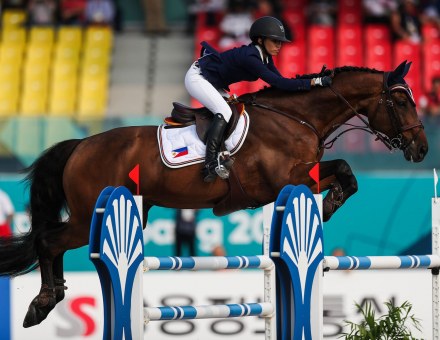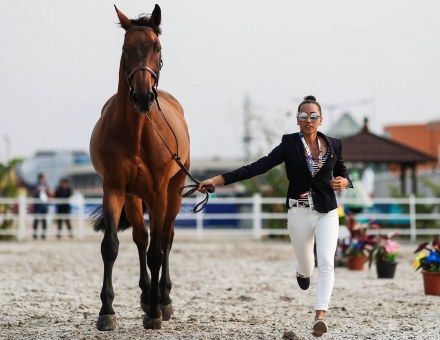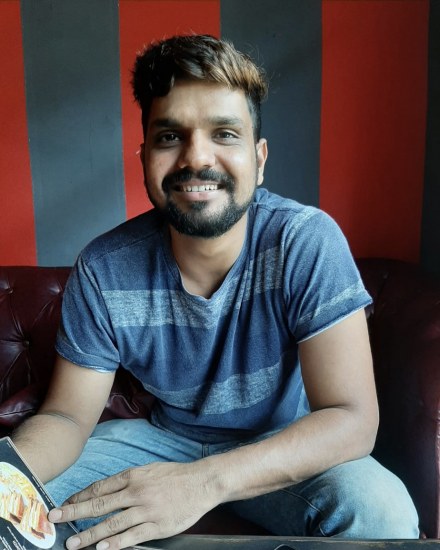Global pandemic or no global pandemic, the sports industry has never been bigger than it is today and therefore needs to adapt to the situation, for the sake of sports fans and consumers. emlyon business school students Chiara Amor, Aymar Henry and Amit Kumar share their thoughts on the preparation they are receiving for the business landscape that awaits them and current and future developments at large, with particular focus on their beloved disciplines of equestrian, tennis and cricket.
“We are living in a world where sports and the industry are big business. From a career perspective, this is something that obviously excites me but, at the same time, it is important that the business aspect does not override the natural passion of people for sport and their desire to practice and watch it”, begins Aymar, a self-confessed tennis fanatic, who can lay claim to previous experience in the field at Wilson. His classmates concur that for their respective sports of choice, the pandemic-impacted landscape of 2020 and beyond has created new challenges for the industry. For Amit, broadcasters have a golden opportunity to innovate and help make sports events more interactive, despite the stadium bans imposed on spectators in so many disciplines around the world: “cricket is my sport of choice and here I can see all kinds of areas where via television and the inventive use of apps, supporters can feel more involved. Why not mike up the players, create new camera angles and effects, even encourage responsible online betting in conjunction with matches. Broadcasters are sometimes associated with merely raking in the money but in the present climate they can assume a new responsible and forward-looking role, at the service of the public”.
A multi-perspective view on the industry


Chiara Amor is in the unusual situation of discovering the sports industry via the emlyon MSc program from the dual perspective of student and a professional sportswoman training to represent her native Philippines at equestrian in the 2024 Paris Olympic Games. The learning experience has opened her eyes, as she confirms: “the program prides itself on developing resourceful in its students and training them to stay ahead of the competition. This I have had to do in spades, juggling my professional sport with studies. Thanks to the MSc, I no longer view competitions from a purely participant perspective. Sports are now a lifestyle choice, one that can be hugely influenced by effective branding and marketing. This is where sports industry professionals come into play.”

The benefits of corporate expertise
As part of the drive to immerse students as soon as possible into this market reality, they are required to conduct an in-company Project where they handle real data and statistics supplied by the participating companies, Paris Saint Germain and Adidas in the most recent case. Teachers have industry experience and all subjects are taught in direct relation to the industry that awaits them after graduation, including such areas as sports marketing and entrepreneurship, the Asian business environment, design processing, and branding. “I had 4 years of prior professional experience before starting the program. What has struck me from the content we have taken on board is the sheer scale of the sports industry, as well as the many intricacies involved and the plethora of market factors that have to be considered”, remarks Amit.

Innovation versus tradition
When questioned on the business environment that awaits them and the challenges that both the industry and they themselves will have to tackle, the recurring theme is that of inclusivity. For Aymar, his beloved tennis faces a dilemma: “I see a clash between tradition and innovation. The business aspect has become over-present, and COVID-19 has brought this into sharp relief. Only the very top players can manage with financial independence. Events also need to review their format, be more accessible to the public and less focussed on which stars are in the VIP box. Resistance to change won’t help the sport one little bit”.
Bringing sports back to the people
As for Chiara, she views the situation currently presented by equestrian and the Olympic Games as one that needs addressing ethically as well as financially: “athletes are starting to speak out on questions of morality, be it the cost of being a professional or issues such as LBGT. Sport is a sociocultural phenomenon but one that now requires not just skill but also a big budget to succeed. Stabling fees have almost doubled in the past couple of years and if I am to realise my Olympic dream, we are looking at 2 million euros to purchase the required standard horse. Regulation is required to bring sports back to the people, be it participants, spectators, or consumers. Let’s get to work!”


